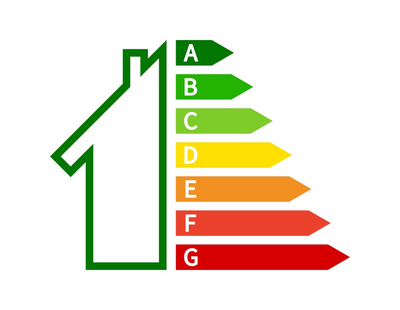
The Building Research Establishment - which undertakes research, advice, training, testing, certification and standards-setting for the housing sector - is calling for a major rethink of Energy Performance Certificates.
A new BRE report - Energy Performance Certificates: Enabling the Home Energy Transition - is published this week, just as the government is consulting on a new Home Energy Model to replace the Standard Assessment Procedure, currently used to assess and compare energy ratings of residential property.
BRE says EPCs have become central to the way we demonstrate and discuss the energy efficiency of our homes, yet now have a much wider application than when they were first introduced.
They are used in delivering retrofit programmes, regulations, and financing, and with the uptake of low carbon heating technologies such as heat pumps set to increase over the next decade, BRE claims the EPC system will need to evolve.
BRE’s report presents ideas for EPCs to develop and for the processes behind them to become better suited to net zero targets. Proposals include:
- EPC lifespans to be reduced from 10 years to five “to provide more up to date advice and information for homeowners”;
- New criteria to determine an EPC rating, which currently is based on the cost to heat and light a home;
- More detailed data used during the EPC rating process to be used to plan retrofitting of energy efficient measures;
- Strengthened training for Domestic Energy Assessors to “build trust and confidence in the system“ and ensure assessors drive the net zero transition of housing stock;
- Developing a provisional EPC rating for the 40 per cent of housing stock currently without any formal EPC rating;
- Encouraging more people to used EPC certificate advice to improve their homes - just five per cent did so in 2022, BRE says.
“Energy Performance Certificates cover 60 per cent of UK homes and are a key source of information used in planning retrofit programmes and in government policies. But too often home buyers and sellers see the certificates as just a bureaucratic necessity” claims Gillian Charlesworth, chief executive of the Building Research Establishment.
“With targeted reforms, the government can ensure the EPC can really achieve its potential, as a trusted starting point for advice and information on how we can all make our homes better.
“The transition to clean energy in homes is starting to gather pace; the last few months have seen an upsurge in interest in installing heat pumps. Whether it’s clean heat, upgrading insulation, solar panels or other modern energy technologies, reforms to the EPC to make it more up-to-date, accurate and usable will be key to supporting homeowners play their part in the journey to net zero.
“We urge policymakers to read this report and consider its recommendations as a way of driving the decarbonisation of the UK’s domestic building stock.”
BRE’s new report can be found here: https://bregroup.com/press-releases/bre-calls-for-reforms-to-epcs-to-help-decarbonise-uk-homes/.















%20-%20IMAGE%20Client%20Accounting%20%E2%80%93%20what%20are%20your%20options.jpg)

%20(002).png)
.png)





Join the conversation
Jump to latest comment and add your reply
There is a lot wrong with EPC and changing the inspections from 10 years to 5 years will do nothing apart from increase administration and cost for landlords. I pay for the heating in over 100 HMO‘s, and the EPC bears no relationship to what it cost me in energy cost to heat a HMO. I’ve tried numerous energy conservation measures and nothing works. I would like them to work as I would like to save on energy costs and do my bit to save the planet.
I am told that EPCSs are based on averages, and like all averages can be manipulated. what is needed is independent testing of energy conservation measures and why are landlord Associations or something like the consumer association have not checked whether energy conservation measures works in practice is a mystery to me. I believe independent research would raise questions over the retrospective use of energy conservation measures. Landlords beware do not believe savings can be made.
Jim Haliburton TheHMODaddy
The BRE was hired by HM Government back in the early 2000s to develop the EPC national measurement system. Their advice today is helpful and well timed. As a Chartered Surveyor, commercial landlord and residential landlord I and my clients have used the EPC system over the last 16 years. Let's make no bones about it, EPCs, MEES and the national public database have helped to greatly reduce energy waste, reduce fuel poverty and reduce CO2 pollution. EPCs and MEES have worked and they continue to help improve quality and standards in our national building stock. It's a national succuss story - but as Brits we don't like to admit that we've had a success and or are actually good at something.
What is unfathomable is why so many PRS domestic landlords have chosen not to install basic insulation in the walls and lofts of their units and fit a lower running cost central heating system. Doing these simple things, over a period of time, is common sense. Always has been.
EPCs are now reliable and accurate if you work with a good assessor and pay them a fee appropriate for a professional service. That's that same with any professional service. We've had the Conservative's excellent Minimum Energy Efficiency Standard (MEES) in place for 9 years but still thousands of landlords think it makes long-term investment sense to own a poor-quality asset and have their customers in crippling fuel poverty.
The domestic EPC has always told landlords and tenants precisely what they need to know. The headline EPC Grade is the running cost measurement. That's the correct thing to measure for most - my rental occupiers care about winter heating bills and NOT carbon emissions. But if you do care about carbon emissions the certificate has (since 2008) presented a secondary EPC Grade with the CO2 pollution measurement. Sensible landlords look at BOTH EPC Grades and aim to get them BOTH to Grade C or better. I can't believe that there are still some domestic landlords that don't understand the EPC national measurement system.
You say EPC inspections are reliable and accurate. This is not the case. Try taking 100 inspectors and see if they all rate the building the same. They won't. And the margin of error will be markedly apparent, especially on refurbished older properties.
I question your assumption that PRS landlords don't use loft insulation. I think you are wrong. I believe they do. As for wall insulation it is more complex and for a solid wall detached house very expensive. Every landlord has a budget. Like any business figures have to stack up. One has to study this subject as a whole not in an arbitrary isolated way that suits your agenda.
EPC inspection saving and guidance costs for work are, in my experience often 400% different from the true cost. In my experience 50% of EPC Inspection costing are clearly inaccurate. As for running cost, inspectors are poorly trained in the variance of an electric radiator and their functionality. The EPC guidance obsession that old storage heaters are more efficient than all newer rads is false. I think you need to get out and see the work of the Inspectors and take a scientific view of heating functionality and cost. Your patronising comment that domestic landlords don't understand the EPC is to be frank, a rather ignorant comment as all landlords are subject to EPC, and most understand and do their best to get a good rating.
Good to see Martin Gibbon's comment.
Overall EPCs have been successful.
One of the huge issues that some landlords do have, is that of buying older housing, at low prices, that is then very difficult to heat, and to correctly retrofit based on the breathability of the building fabric.
Those landlords with newer stock, such as some ex RTBs, will know of this issue.
After all, if we rent a car, we expect a recent build of car, not car that is for instance 40 years old.
I am a surveyor, EPC assessor and a retrofit assessor.
In what way have EPCs been successful? Tenants ignore them and are not interested in them.
At least Gibbo has found a new friend in your first ever post. 🤣
Yes but if you AGREE to rent the 40 yr old car you would agree to pay a lower price than a recent build. So logically if these upgrades are made the end result will be a higher rent and an air tight house which will result in a higher case of mould
I have seen poor EPC inspections, corrupt EPC surveyors and EPC surveys that are simply wrong. Example: last month an EPC inspector gave a F rating on one of my luxury apartments that previously had a C rating before. I complained and a new EPC inspector gave a D rating. If an EPC audit is done I know without question the property would be given at least a D rating. This type of incompetence is costly to landlords. An F rating means it is not rentable. In my opinion, 20% or so of EPC inspectors are incompetent. They need better training and understanding of building construction and modern heating appliances and should make better judgements of insulation they cannot see. If for example the apartment has passed building regulation, the assumption should be it has insulation to building regulation standards for that year.
Overall, the introduction of EPC has been a very positive step forward. However, it could be fine-tuned and improved.
It’s a total lottery
I have a block of 6 flats all totally rebuilt 3 years ago to meet all building regulations insulation values yet the EPC inspector gave them all a 'C rating ' - how is this possible???? When asked to justify the 'C' rating he said he could not see the insulation!!!! How do you see insulation in cavity walls???? The FACT that I provided him with the building regulations completion certificates was not taken into account - he said he cannot enter that FACT into hiss assessment form!!!!
Please login to comment